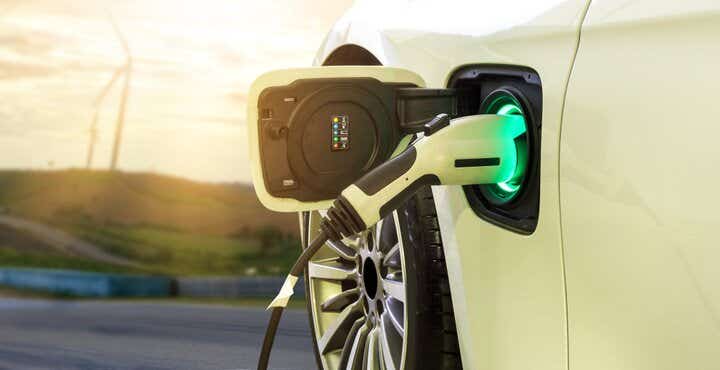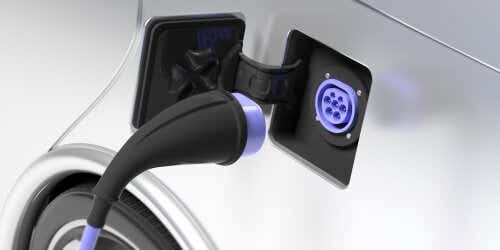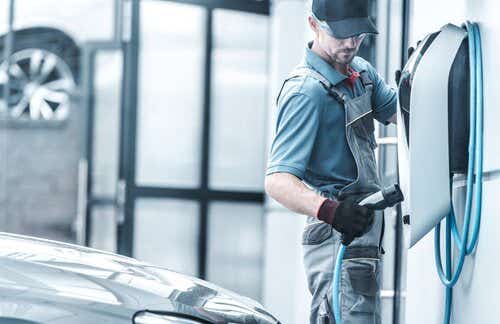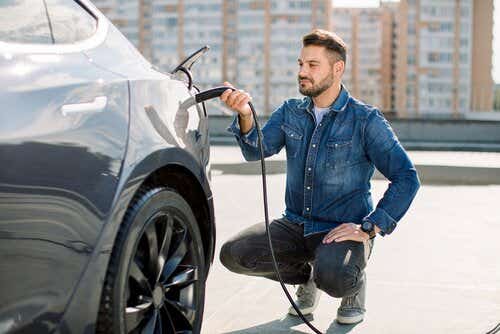Because you’re not filling it up with petrol (unless you have a hybrid), you’ll need to be able to connect it to a charger at home or out and about so you can top up the battery.
What should you be looking for when choosing an EV charging cable, though?
How do I choose an EV charging cable?
There are a few things to think about when choosing an EV charging cable: the type of connector, the type of power source you’re likely to use and the type of current likely to be provided.
Connector type
Electric car charging cables have two connectors, one at each end - one connects to the charging unit and the other connects to the car, so it’s important that you get one which will provide an optimal charging performance.
There are two types of connector: Type 1 and Type 2. Type 1 is the Asian, Japanese and American standard (and is single-phase only) while Type 2 inlet is the European standard and covers both single and three-phase charging. Almost all electric vehicles can use a Type 2 connector, though some older models will exclusively use a Type 1 connector.
You can get cables that plug into standard three-pin plug sockets, but this isn’t recommended as best practice - it will take a long time to charge the car and cause reduced performance over time. It’s much more advisable to get a Type 2 EV charging cable.
Power sources and ratings
Single-phase and three-phase power
Single-phase power is typically available from residential properties, while three-phase power is typically available from commercial buildings. Three-phase power can deliver more current than single-phase power, so a car plugged into a three-phase network will charge three times quicker.
With that in mind, charging cables are optimised to facilitate both single-phase and three-phase charging, but it’s worth being aware of which type of power you’re plugged in to so proper charging time expectations can be set.
Alternating current and direct current power
EV batteries require direct current (DC) power to charge - they can accept alternating current (AC) power but this then has to be converted by the car into DC power. EVs plugged into DC chargers will therefore charge more quickly because the conversion from AC power doesn’t need to happen. However, direct current chargers are typically only available at service stations and locations where rapid charging is important, rather than at home.
Current rating
Charging cable current ratings come in either 16 or 32 amps, with the former commonly found at home and the latter found at public charging points. A 16 amp cable charges the vehicle more slowly, but as 32 amp charging cables can be used in a 16 amp charger, it could be worth investing in a 32 amp cable to help you charge at public charging points.
Which EV charging cable should I choose?
You’ll almost certainly need a cable that can cope with a home charger - whether you want one that can also cope with direct current public chargers depends how often you think you’ll need to charge away from home.
At a minimum, you need one that will match the car’s maximum AC charging rate, which your manufacturer handbook or dealer will be able to help you pinpoint.
For instance, in the table below, we see how a Honda e, with a maximum charging rate of 6.6 kW, charges with different power types.
| Charging point | Max power | Power | Time to charge fully |
|---|---|---|---|
| 1-phase 16A (3.7 kW) | 230V / 1x16A | 3.7 kW | 9h15m |
| 1-phase 32A (7.4 kW) | 230V / 1x29A | 6.6 kW | 5h15m |
| 3-phase 16A (11 kW) | 230V / 1x16A | 3.7 kW | 9h15m |
| 3-phase 32A (22 kW) | 230V / 1x29A | 6.6 kW | 5h15m |
Figures taken from https://ev-database.uk/
A single-phase 32 amp charger will charge at around 7.2 kW per hour, but as the Honda e only has a maximum charging rate of 6.6 kW, it won’t exceed that in terms of power. Similarly, a three-phase 32 amp charger will charge at about 22 kW per hour, but here it can’t go faster than 6.6 kW.
Regardless of the single-phase/three-phase or 16 amp/32 amp options, charging speed will ultimately be dictated by the car’s maximum charging rate, so make sure you know what that is and how the different cable types in different locations will affect charging speed. The higher the battery capacity, the more power it will need to charge quickly, so those with bigger batteries should probably opt for a 32 amp cable - it will work perfectly well in 16 amp connectors but be invaluable when more powerful DC chargers are available to use.
How long should an EV cable be?
A longer electric car charging cable will make it easier to reach public charging points, while a shorter cable will be easier to store. 7.5 metres is a good compromise, but you may prefer a longer or shorter option.
What should the EV cable’s power rating be?
You’ll need a cable that matches your vehicle’s maximum charging rate. This goes back to the table above - you’ll want one that matches the maximum AC charging rate of the car, at least.
Do I need a separate charging cable?
Most EV drivers get a separate charging cable, especially if they have a tethered home charging unit. They can then carry the cable in the car so they can connect to public charging points when they’re on the move, though some charging points will be tethered so there won’t be a need for your cable.
Unsure if you need an EV home charger? Find the advice you need for the stage you're at here.

I'm considering buying an EV
If you're thinking about getting an EV, what do you need to consider when it comes to charging?

My EV is on the way
If you've ordered an EV, what do you need to do to prepare for its arrival?

I already have an EV
If you have an EV and you're considering installing a home charger, we can help advise you.




